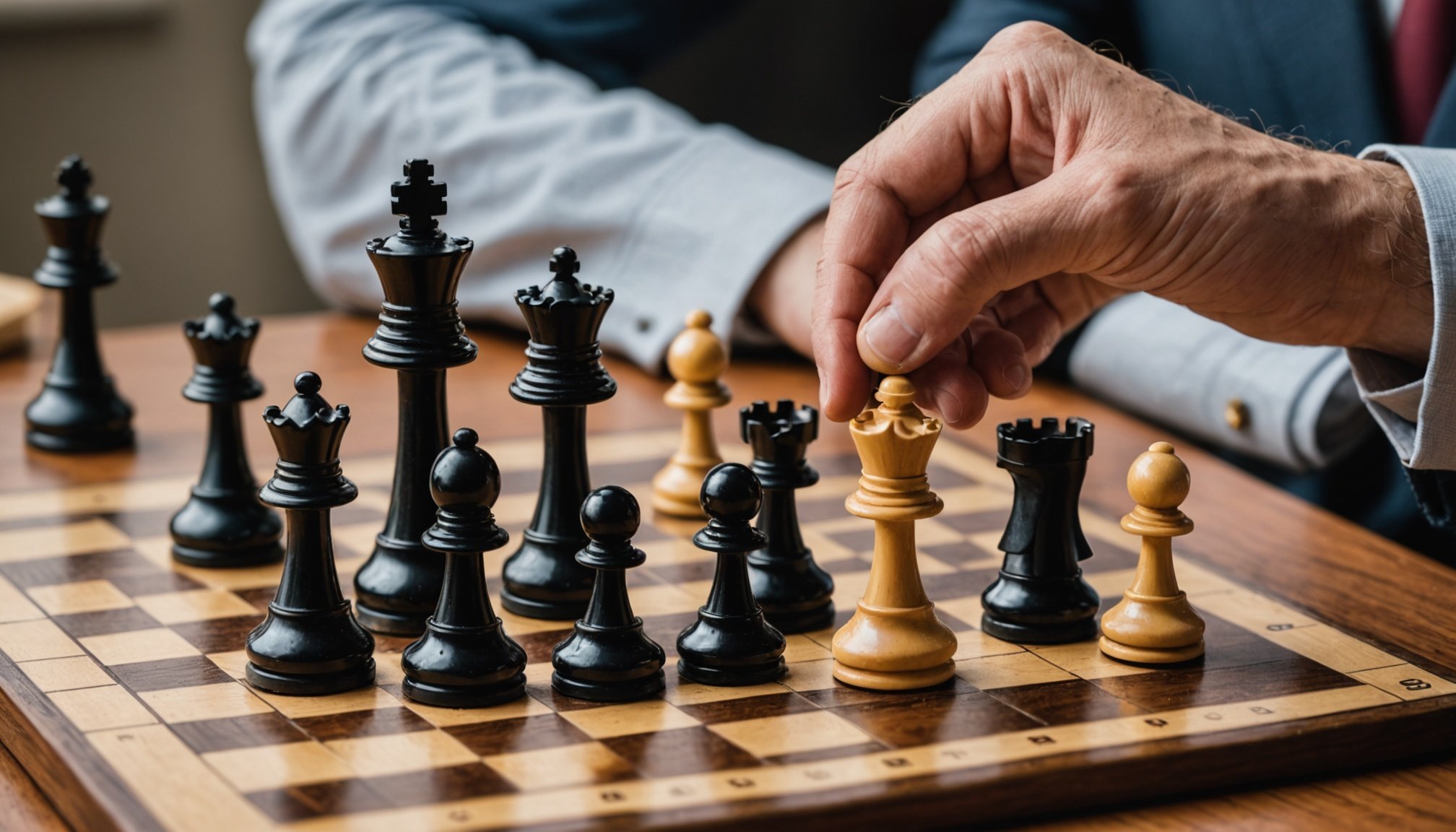Unveiling the Enduring Health Benefits of Competitive Chess: Your Ultimate Guide to Mental Wellness and Strategy
The Mental Health Benefits of Chess: A Deep Dive
Chess, often regarded as the ultimate strategy game, has been a cornerstone of intellectual pursuits for centuries. Beyond its recreational value, chess offers a plethora of health benefits that can significantly enhance your mental wellbeing and strategic thinking. Here, we will explore the various ways in which competitive chess can be a powerful tool for your mental health.
Cognitive Enhancement
Playing chess regularly can have a profound impact on your cognitive functions. Research has shown that engaging in strategic games like chess can sharpen your strategic planning and decision-making abilities, making it easier to navigate complex problems and develop practical solutions[2][4].
Also to read : How Can Lifestyle Changes Transform the Future of Health in the UK?
- Improved Memory: Chess requires players to remember various moves, strategies, and patterns. This consistent mental exercise can improve your overall cognitive flexibility and problem-solving speed.
- Enhanced Concentration: The discipline of focusing on a single game and considering multiple variables at once enhances your overall concentration and mental clarity.
- Boosted Creativity: The game demands creative thinking and the ability to foresee potential outcomes, which can foster a more innovative and adaptable mind.
Psychological Health
The psychological health benefits of chess are equally compelling. Studies have indicated that playing chess can help protect against cognitive decline in older adults and may even reduce the risk of dementia[4].
- Stress Management: The intense focus required to play chess can serve as a form of meditation, helping to reduce stress and anxiety. As Dr. Robert Sapolsky, a neuroscientist from Stanford University, notes, “Engaging in activities that challenge the brain can help build cognitive reserve, which can protect against age-related cognitive decline.”
- Emotional Regulation: Chess teaches players to manage their emotions, particularly in high-pressure situations. This skill can translate into real-life scenarios, helping individuals to remain calm and composed under stress.
- Social Benefits: Participating in chess tournaments or clubs provides opportunities for social interaction, which is crucial for mental wellbeing. Social activities have been shown to reduce the risk of cognitive decline and dementia[4].
The Strategic Aspects of Chess: How It Shapes Your Decision Making
Chess is more than just a game; it is a school of strategy that can significantly improve your decision-making skills.
Topic to read : Unlock effective techniques to reduce screen time and boost your mental health
Analyzing Moves and Outcomes
In chess, every move is a decision that has consequences. This process of analyzing moves and anticipating outcomes strengthens your ability to think critically and make informed decisions.
- Long-term Planning: Chess players must think several moves ahead, a skill that can be applied to real-life situations. This long-term planning helps in making better decisions by considering the potential consequences of each action.
- Risk Management: The game teaches you to weigh risks and rewards, a crucial skill in both personal and professional life. By understanding how to manage risks in chess, you can better navigate complex situations in your business or personal life.
Real-Life Applications
The strategic skills honed through chess can be applied in various aspects of life, from business management to personal decision making.
- Business Strategy: The ability to analyze situations, anticipate outcomes, and make strategic decisions is invaluable in the business world. As Gary Kasparov, the former world chess champion, once said, “Chess is a very good tool for developing critical thinking and problem-solving skills, which are essential in any business environment.”
- Personal Development: Chess can help you develop a more systematic approach to problem-solving, which can be beneficial in managing your personal life, whether it’s planning your career or making financial decisions.
How to Incorporate Chess into Your Health and Wellness Routine
Incorporating chess into your daily or weekly routine can be straightforward and rewarding.
Starting Your Chess Journey
If you are new to chess, here are some steps to get you started:
- Learn the Basics: Understand the rules and basic strategies of the game. There are numerous online resources and tutorials that can help you learn chess from scratch.
- Join a Chess Club or Online Community: Engaging with other chess players can enhance your learning experience and provide opportunities for social interaction.
- Practice Regularly: Consistency is key. Set aside time each day or week to practice and improve your skills.
Integrating Chess with Other Health Practices
Chess can be part of a broader health and wellness routine that includes physical exercise, a balanced diet, and adequate sleep.
- Physical Exercise: Regular physical activity, such as jogging or swimming, can enhance mental clarity and resilience. Combining physical exercise with mental exercises like chess can create a holistic approach to health[2].
- Balanced Diet: A diet rich in nutrients that support brain health, such as omega-3 fatty acids and antioxidants, can complement the cognitive benefits of playing chess[2].
- Adequate Sleep: Proper sleep is crucial for cognitive processes such as memory consolidation and problem-solving. Ensuring you get 7-9 hours of quality sleep each night can help you make the most out of your chess practice[2].
Practical Tips and Strategies for Improving Your Chess Game
Here are some practical tips to help you improve your chess game and maximize its health benefits:
Daily Brain Exercises
In addition to playing chess, incorporating other brain exercises into your routine can enhance cognitive function.
- Sudoku and Crosswords: Engage in puzzles like Sudoku or crosswords to boost pattern recognition and cognitive flexibility[2][4].
- Memory Games: Use memory exercises to improve focus and mental agility. These can include games like memory matching or brain teasers[2].
Time Management
Effective time management is crucial for balancing your chess practice with other aspects of your life.
- Set Aside Dedicated Time: Allocate a specific time each day or week for chess practice to ensure consistency.
- Use Technology: Utilize chess apps or online platforms to practice during your free time, such as during commutes or breaks.
Learning from Masters
Studying the strategies and games of chess masters can provide valuable insights and improve your game.
- Analyze Games: Watch and analyze games played by grandmasters to understand different strategies and techniques.
- Read Chess Literature: There are numerous books and articles written by chess experts that can offer tips and strategies to improve your game.
Table: Comparing the Health Benefits of Different Brain Exercises
| Brain Exercise | Cognitive Benefits | Emotional Benefits | Social Benefits |
|---|---|---|---|
| Chess | Improves memory, concentration, and strategic thinking | Helps in stress management and emotional regulation | Provides opportunities for social interaction through clubs and tournaments |
| Sudoku | Enhances pattern recognition and cognitive flexibility | Reduces mental fatigue and stress | Limited social interaction, but can be played in groups |
| Crosswords | Stimulates brain and improves vocabulary | Reduces anxiety and improves mood | Can be played in groups or with friends |
| Memory Games | Improves focus and mental agility | Enhances emotional stability | Can be played with others, promoting social interaction |
| Jigsaw Puzzles | Improves perception, mental rotation, and working memory | Reduces stress and improves mood | Can be a solo activity, but also enjoyed with family or friends |
Quotes from Experts and Players
- Gary Kasparov: “Chess is a very good tool for developing critical thinking and problem-solving skills, which are essential in any business environment.”
- Dr. Robert Sapolsky: “Engaging in activities that challenge the brain can help build cognitive reserve, which can protect against age-related cognitive decline.”
- Magnus Carlsen: “Chess is a game that requires a lot of concentration and focus. It helps you develop the ability to think critically and make informed decisions.”
Competitive chess is more than just a game; it is a powerful tool for enhancing your mental wellbeing and strategic thinking. By incorporating chess into your health and wellness routine, you can improve your cognitive functions, manage stress, and develop better decision-making skills. Whether you are a seasoned player or just starting out, the enduring health benefits of chess make it an invaluable addition to your life.
As you embark on this new year, consider making chess a part of your journey towards better mental health and wellbeing. With its rich history, strategic depth, and numerous health benefits, chess is the perfect game to help you navigate the complexities of the modern world with clarity and precision. So, take the first move, and discover a new world of mental wellness and strategy through the game of chess.

